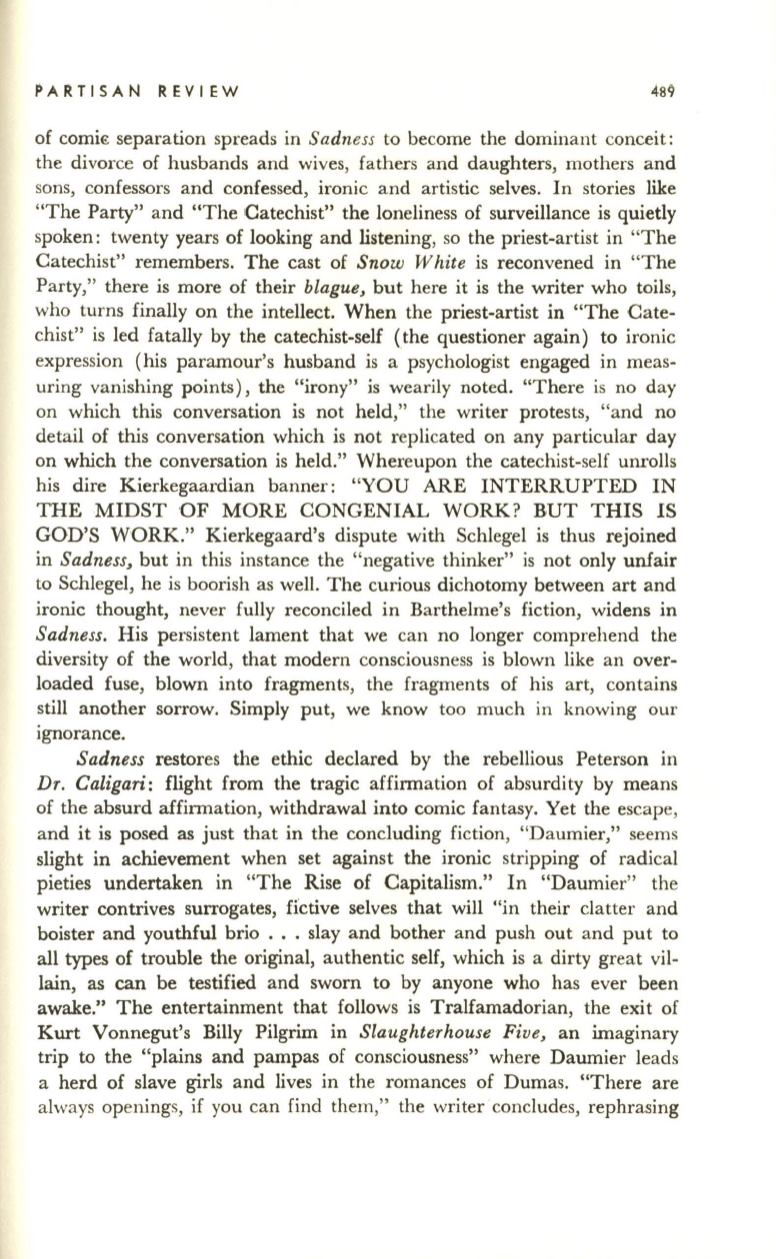
PARTISAN REVIEW
489
of comi€ separation spreads in
Sadness
to become the dominant conceit:
the divorce of husbands and wives, fathers and daughters, mothers and
sons, confessors and confessed, ironic and artistic selves. In stories like
"The Party" and "The Catechist" the loneliness of surveillance is quietly
spoken: twenty years of looking and listening, so the priest-artist in "The
Catechist" remembers. The cast of
Snow White
is reconvened in "The
Party," there is more of their
blague,
but here it is the writer who toils,
who turns finally on the intellect. When the priest-artist in "The Cate–
chist" is led fatally by the catechist-self (the questioner again) to ironic
expression (his paramour's husband is a psychologist engaged in meas–
uring vanishing points), the "irony" is wearily noted. "There is no day
on which this conversation is not held," the writer protests, "and no
detail of this conversation which is not replicated on any particular day
on which the conversation is held." Whereupon the catechist-self unrolls
his dire Kierkegaardian banner: "YOU ARE INTERRUPTED IN
THE MIDST OF MORE CONGENIAL WORK? BUT THIS IS
GOD'S WORK." Kierkegaard's dispute with Schlegel is thus rejoined
in
Sadness,
but in this instance the "negative thinker" is not only unfair
to Schlegel, he is boorish as well. The curious dichotomy between art and
ironic thought, never fully reconciled in Barthelme's fiction, widens in
Sadness.
His persistent lament that we can no longer comprehend the
diversity of the world, that modern consciousness is blown like an over–
loaded fuse, blown into fragments, the fragments of his art, contains
still another sorrow. Simply put, we know too much in knowing our
ignorance.
Sadness
restores the ethic declared by the rebellious Peterson in
Dr. Caligari:
flight from the tragic affirmation of absurdity by means
of the absurd affirmation, withdrawal into comic fantasy. Yet the escape,
and it is posed as just that in the concluding fiction, "Daumier," seems
slight in achievement when set against the ironic stripping of radical
pieties undertaken in "The Rise of Capitalism." In "Daumier" the
writer contrives surrogates, fictive selves that will "in their clatter and
boister and youthful brio ... slay and bother and push out and put to
all types of trouble the original, authentic self, which is a dirty great vil–
lain, as can be testified and sworn to by anyone who has ever been
awake." The entertainment that follows is Tralfamadorian, the exit of
Kurt Vonnegut's Billy Pilgrim in
Slaughterhouse Five,
an imaginary
trip to the "plains and pampas of consciousness" where Daumier leads
a herd of slave girls and lives in the romances of Dumas. "There are
always openings, if you can find them," the writer concludes, rephrasing


